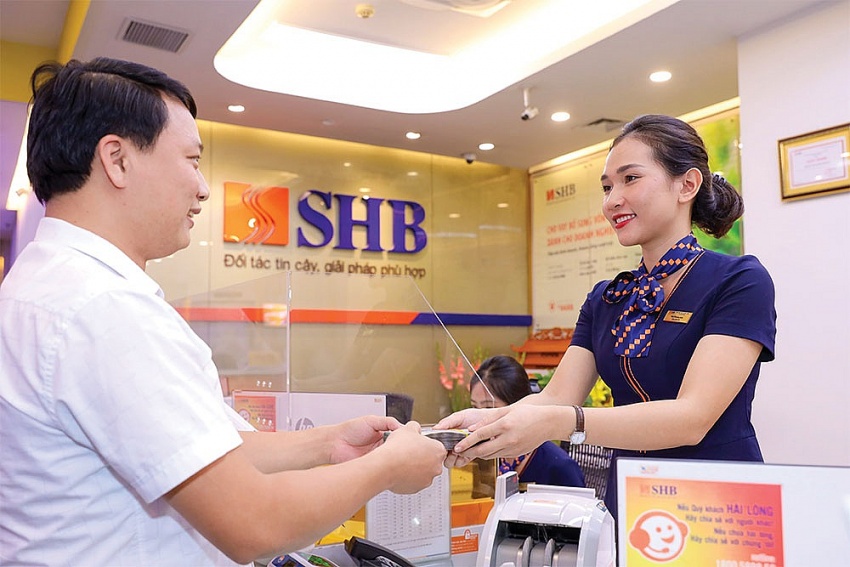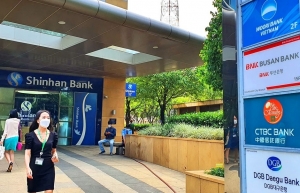Lenders play the foreign equity game
Vietnamese digital bank Timo this month clinched an extra $10 million from its incumbent investors, according to DealStreetAsia, signalling continued faith in the digital banking sector amidst an accelerating trend of digitalisation in Southeast Asia. However, the identities of those participating in this funding round have not been made public.
According to startup data aggregator, CrunchBase, Timo had formerly drawn in a substantial $20 million through a venture round in 2022.
Prominent investors in the digital bank include Jungle Ventures, Kredivo Holdings, Phoenix Holdings, Granite Oak, and venture capital leader Square Peg Capital, which spearheaded the previous venture round. These backers have a history of funding successful startups, including Canva, FinAccel, and Airwallex.
 |
| Overseas investors are reportedly interested in taking a slice of Hanoi-based SHB, photo Le Toan |
The 2022 venture round marked Timo’s inaugural plunge into external fundraising. Credible sources, compiled by TechInAsia, indicated at that juncture that the raised capital would fuel technological innovation, honing in on products curated expressly for the Vietnamese market.
This strategic decision coincided with an increasing receptiveness towards digital banking products across Southeast Asia, with Vietnam standing out in particular.
A number of conventional credit institutions are also seeking additional financial buffers from foreign investors.
Hanoi-headquartered lender SHB in July was reportedly in talks to sell up to 20 per cent of its equity to overseas investors, marking a significant movement in Vietnam’s banking sector, insiders said. The forthcoming transaction, which values the Vietnamese bank at an estimated $2-2.2 billion, is garnering substantial interest, particularly from investors in South Korea and Japan.
The deal, contingent on approval from the State Bank of Vietnam, is anticipated to be finalised either this year or in the early part of 2024, reported Reuters.
A spokesperson from SHB has disclosed that the bank is “proactively seeking partnerships with a variety of potential associates” both domestic and international, in an effort to maximise benefits for the bank and its shareholders.
In June, a group of 21 shareholders of Saigon-Hanoi Insurance Corporation, SHB’s insurance arm, agreed to transfer 75 per cent to South Korea’s DB Insurance. A key component of the DB Group ecosystem, the company had previously secured a controlling 75.18 per cent stake in Vietnam’s Aviation Insurance Corporation.
Meanwhile, BRG-backed SeABank also announced its strategy to privately issue a new tranche of shares while abiding by the regulations relating to maximum foreign ownership levels. It expects to privately release up to 94.6 million new shares, approximately 4.64 per cent of the bank’s currently circulating shares. Norfund, the Norwegian investment fund focused on supporting developing countries, is predicted to be the main investor in this issuance. The offering price, still under negotiation with the investor, will be finalised by SeABank’s board, expecting to augment the bank’s assets by $50.71 million to $145.96 million.
SeABank is among a handful of banks in Vietnam currently operating without a foreign strategic stakeholder, a consistent point of discussion among shareholders at recent AGMs.
Kent Wong, partner, head of Capital Markets at VCI Legal, believes that this fundraising comes as Vietnamese banks are shoring up their capital and reserves to withstand rising competition and a potential deceleration in Vietnam’s economy, partly due to a slowdown in the real estate sector. It also underscores the strategic advantage of having a foreign investor onboard, providing not only financial support but also global market insights and expertise.
“Acquiring a stake in SHB, for example, would be a compelling proposition for any strategic investor. South Korean and Japanese investors, in particular, can potentially benefit from this investment. South Korea and Japan have a historical track record of successful investments in Southeast Asia, and a minor stake in SHB would align with their broader geopolitical and economic strategies,” he told VIR.
Wong also noted that SeABank is considering selling a minor stake that falls below the bank’s foreign ownership limit of 5 per cent. This approach, aside from bolstering the bank’s capital and improving liquidity, offers an intriguing opportunity to bring a foreign strategic investor onboard.
“The proposed sale of a minor stake represents more than a mere capital-raising venture. It also signifies a strategic manoeuvre designed to draw in international investors who can bring a wealth of expertise, innovation, and oversight,” he said.
 | Lenders reinforce security measures By harnessing the power of chip-embedded ID cards, AI, and reliable population data, banks in Vietnam are reinforcing security measures and revolutionising banking services for their customers. |
 | Lenders determined to meet financing needs of customers In line with the government’s economic stimulus initiatives and to ensure market liquidity, a number of major financial institutions are implementing strategies to address the financing needs of businesses and individuals. |
 | Korean lenders aspiring to become major market players South Korean financial conglomerates are deepening their involvement in Vietnam through a series of strategic agreements in energy, banking system restructuring, and digital payments. |
What the stars mean:
★ Poor ★ ★ Promising ★★★ Good ★★★★ Very good ★★★★★ Exceptional
Related Contents
Latest News
More News
- Private capital funds as cornerstone of IFC plans (February 20, 2026 | 14:38)
- Priorities for building credibility and momentum within Vietnamese IFCs (February 20, 2026 | 14:29)
- How Hong Kong can bridge critical financial centre gaps (February 20, 2026 | 14:22)
- All global experiences useful for Vietnam’s international financial hub (February 20, 2026 | 14:16)
- Raised ties reaffirm strategic trust (February 20, 2026 | 14:06)
- Sustained growth can translate into income gains (February 19, 2026 | 18:55)
- The vision to maintain a stable monetary policy (February 19, 2026 | 08:50)
- Banking sector faces data governance hurdles in AI transition (February 19, 2026 | 08:00)
- AI leading to shift in banking roles (February 18, 2026 | 19:54)
- Digital banking enters season of transformation (February 16, 2026 | 09:00)

 Tag:
Tag:



















 Mobile Version
Mobile Version